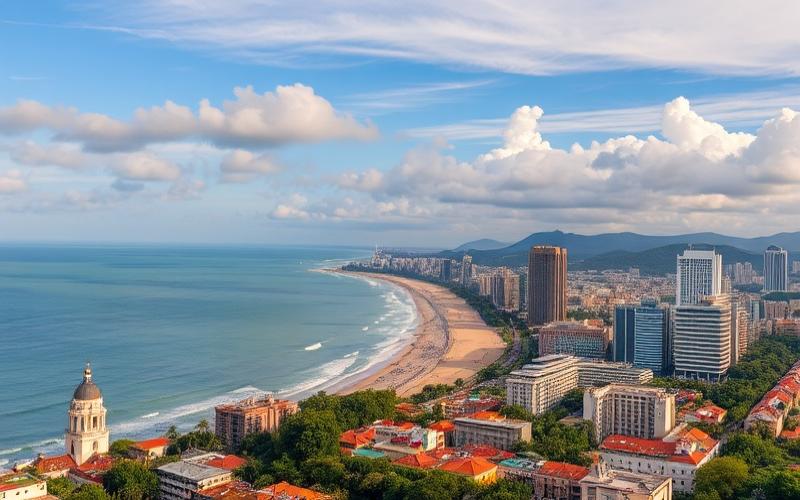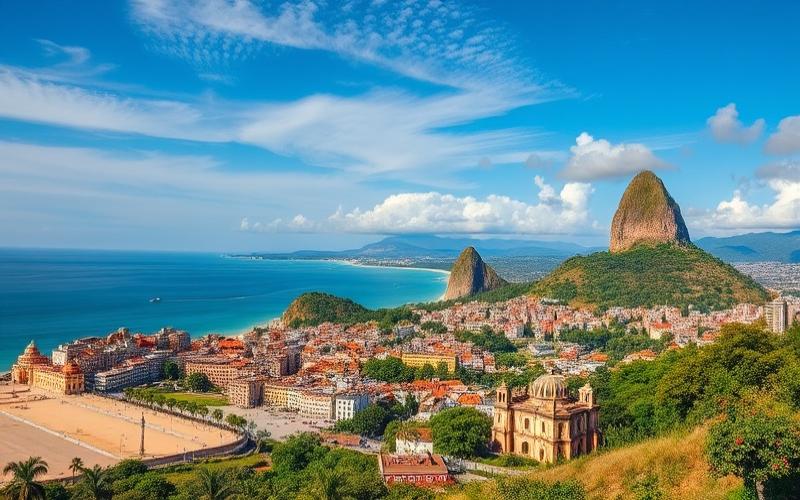
 Published on and written by Cyril Jarnias
Published on and written by Cyril Jarnias
Moving to Brazil is an exciting and enriching adventure, but the language barrier can sometimes turn this experience into a daily challenge. Immersed in an ocean of vibrant culture, expatriates quickly discover the importance of learning Portuguese, the country’s official language.
This article aims to guide you through the best methods and resources to effectively master the local language, whether through interactive online courses, language exchange groups, or innovative applications.
Whether you want to integrate more easily into your new Brazilian neighborhood or expand your professional opportunities, this exploration of learning tools will help you overcome linguistic challenges and fully enjoy your new life under the Brazilian sun.
Introduction to Learning the Portuguese Language in Brazil
Portuguese is the official language of Brazil, spoken by nearly 99% of the population, and plays a central role in social and professional integration. Its mastery is mandatory in many areas of daily life, including education, work, media, and services, for both Brazilians and foreigners residing in the country for more than a year.
Linguistic Diversity in Brazil:
- Brazil has great linguistic diversity with approximately 274 indigenous languages still spoken in some regions, as well as languages from immigration (German, Italian, Japanese, etc.).
- This diversity can influence the learning of Portuguese, especially in rural or indigenous areas where native or regional languages are still alive. However, Portuguese remains the reference language for national integration.
Differences Between Brazilian Portuguese and European Portuguese:
| Aspect | Brazilian Portuguese | European Portuguese |
|---|---|---|
| Pronunciation | More open, often stressed syllables | More closed, frequent elisions |
| Grammar | Frequent use of the pronoun “você” | Use of “tu” and “você” depending on context |
| Vocabulary | Many words of African or indigenous origin | Vocabulary closer to ancient Portuguese |
| Expressions | Many regional specificities | Own idiomatic expressions |
Statistics and Facts About Language in Brazil:
- Brazil represents about 80% of the world’s Portuguese speakers, with a population of over 215 million inhabitants.
- Portuguese is the 8th most spoken language in the world.
- Its geographical dispersion covers the entire Brazilian territory, from the Amazon to the major southern metropolises.
Common Motivations for Expatriates to Learn Portuguese:
- Facilitate professional and social integration.
- Access qualified positions and interact effectively in the workplace.
- Understand local culture, social codes, and media.
- Build more authentic connections with the Brazilian population.
Learning Portuguese: Access to Local Culture
Learning Portuguese allows for a better grasp of cultural references, humor, music (samba, bossa nova), literature, and popular traditions. The language is an essential vector for understanding the subtleties of Brazilian society.
Preliminary Tips for Starting Your Learning:
- Familiarize yourself with the specific sounds of Brazilian Portuguese from the beginning.
- Prioritize listening (podcasts, songs, videos) to get used to accents and pronunciation.
- Learn common vocabulary related to daily life (shopping, transportation, health, etc.).
- Practice regularly with native speakers, even orally from the first weeks.
- Use specialized applications or platforms to structure learning.
Importance of Language Immersion:
On-site immersion, by living in Brazil, is a major asset: it accelerates language acquisition, allows adaptation to different regional variants, and promotes a fine understanding of local culture and social customs.
Key Takeaways:
- Mastering Portuguese is essential to fully integrate into Brazil, both professionally and personally.
- The country’s linguistic richness constitutes a unique opportunity to discover a plural culture, while benefiting from a unifying common language.
Good to Know:
Portuguese, the official language and engine of integration in Brazil, is spoken by more than 210 million people; to better understand the local culture, prioritize language immersion and familiarize yourself with local variations influenced by the country’s diversity.
Effective Strategies and Methods According to Learner Profile
Pedagogical adaptation to expatriate learner profiles in Brazil involves a diversity of methods to meet individual needs and promote successful integration. Here are the main recommended approaches and strategies according to different sensory and cognitive profiles:
- Visual Learners
Use of illustrated materials, educational videos, explanatory diagrams, and interactive mobile applications (for example, Duolingo or Babbel in Brazilian Portuguese). Local Facebook groups often offer infographics on Brazilian culture.
Effective strategy: regular viewing of Brazilian series or movies with subtitles to reinforce image-language association. - Auditory Learners
Listening to local podcasts like “Café Brasil” or “NerdCast,” participation in conversational workshops, use of audio-trainers dedicated to learning Portuguese.
Effective strategy: daily listening to Brazilian songs while analyzing lyrics; regular follow-up of local radio news. - Kinesthetic Learners
Engagement in practical activities such as samba/forró dance classes, Brazilian cooking in participatory workshops, or group language games.
Effective strategy: practice Portuguese at local sports events or associative volunteering to acquire contextual vocabulary through gesture. - Logical Learners
Intensive use of structured applications (Memrise with personalized planning), comparative analysis between languages via grammatical charts, solving progressive exercises on specialized platforms.
Effective strategy: regular organization of sessions focused on solving complex linguistic problems (advanced grammar). - Social Learners
Active participation in conversation groups such as those organized in international schools in São Paulo or Rio; membership in professional networks like Club Pro São Paulo to exchange with French/Portuguese-speaking expatriates; monthly cultural events open to newcomers.
| Profile | Resources Available in Brazil | Concrete Examples | Optimal Use |
|---|---|---|---|
| Visual | Mobile apps, infographics | Duolingo Brazil, cultural YouTube videos | Learning by observation |
| Auditory | Local podcasts, audio-trainers | Café Brasil Podcast | Repeated listening + discussions |
| Kinesthetic | Practical physical workshops | Local cooking/dance classes | Active immersion |
| Logical | Structured platforms | Memrise Portugal/Brazil | Gradual/logical exercises |
| Social | Groups & professional networks | Club Pro São Paulo/Rede Rio Pro | Regular interaction |
Pedagogical adaptation is not limited to the choice of support but also involves personalization:
- For connected learners, daily use of mobile applications allows for flexible and playful learning adapted to individual pace.
- For those who benefit more from the living context, cultural immersion is essential: participation in local parties (Carnival), intercultural workshops accessible even before arrival through specialized social networks.
Attendance at international schools also facilitates multilingual development in an open multicultural environment where each child can follow a recognized curriculum while gradually integrating through various extracurricular activities.
Major Advantages:
- Rapid strengthening of language skills through contextualization.
- Reduction of culture shock through social immersion.
- Natural acquisition of common vocabulary via daily interactions with native speakers during public or associative events.
By combining these digital tools and local opportunities according to each sensory/cognitive profile, it becomes possible not only to learn effectively but also to integrate sustainably into Brazilian society while valuing one’s cultural uniqueness.
Good to Know:
Auditory learners can benefit from local podcasts in Brazilian Portuguese, while kinesthetic learners will profit from community events for practical immersion; mobile applications and conversation groups are also excellent resources for customizable and interactive learning.
Essential Resources for Self-Learning and Formal Courses
Popular Mobile Applications for Learning Portuguese in Brazil
- Duolingo: Playful and progressive learning of vocabulary, grammar, and oral expression. Ideal for beginners.
- Babbel: Interactive courses focused on real situations, with voice recognition and content adapted to different levels (paid).
- MosaLingua, Mondly, Memrise, Busuu: Varied approaches including spaced repetition, interaction with natives, short and customizable daily exercises.
- FunEasyLearn: Free application focused on vocabulary learning (6000 words), with illustrations and educational games.
| Application | Strengths | Target Audience |
|---|---|---|
| Duolingo | Free, very accessible | Beginners |
| Babbel | Structured content | Beginners/intermediate |
| Busuu | Oral practice with natives | All levels |
| FunEasyLearn | Visual vocabulary | Beginners/children |
Online Course Platforms
- Coursera offers university modules (e.g., “Portuguese for Spanish Speakers”) often free in open access.
- Rosetta Stone focuses on total immersion via interactive audio/visual repetition (subscription required).
- Other useful options: Preply (private online lessons), Lingoda.
Podcasts Specialized in Learning Portuguese
For all levels:
- PortuguesePod101: short audio lessons accompanied by written supports.
- Fala Gringo! or Café Brasil: immersion in Brazilian culture through authentic dialogues.
Recommended Reference Books
Beginners:
- “Brazilian Portuguese – Assimil Method”
- “Portuguese Express” – Hachette
- “Progressive Portuguese Grammar” – CLE International
Intermediate:
- “Gramática Ativa 1 & 2”
- “501 Portuguese Verbs”
Educational YouTube Channels Offering Free Lessons
- Practice Portuguese (European content but adaptable)
- Speaking Brazilian Language School
- Portuguese with Leo
- Semantica Portuguese
The videos cover grammar, pronunciation, idiomatic expressions, and real-life situations.
Formal Courses in Brazil — Reputable Schools in São Paulo & Rio
List of recognized schools:
São Paulo:
- Fast Forward Language Institute
- Aprenda2
Rio de Janeiro:
- Cel.Lep
- Casa do Caminho Language Centre
These institutions offer intensive or extensive programs specifically designed for expatriates. Many also offer complementary cultural support.
Furthermore, public universities like USP (Universidade de São Paulo) or PUC-Rio regularly offer summer/intensive courses open to foreigners wishing to improve their academic or professional Portuguese.
Online & Local Conversation Groups
Practical recommendations:
Online:
- Dedicated Facebook groups (“French in São Paulo”, “Expatriados em Rio”)
- Meetup.com platforms regularly offering virtual language exchanges
Local:
- Weekly language cafes in major cities
- Tandems organized by certain schools/institutes
These groups allow for regular practice in an informal setting to improve fluency while meeting other learners and natives.
Good to Know:
To learn Portuguese in Brazil, adopt Duolingo for daily use and explore YouTube channels like “Portuguese with Leticia” for interactive lessons; for in-depth immersion, consider courses at the University of São Paulo or participate in conversation groups such as “Tandem Meetings” in Rio.
Professional and Cultural Benefits of Mastering Portuguese
Mastering Portuguese in Brazil offers major professional advantages:
- Access to an expanded job market: Brazil, the world’s fifth-largest economy, is experiencing strong growth in various sectors (agribusiness, energy, tourism, services). Speaking Portuguese allows access to these opportunities and integration into large local or international companies established in the country.
- Improved career opportunities: The Portuguese language is sought after in international trade, import-export, tourism, hospitality, and even humanitarian work. Many foreign subsidiaries, particularly French ones, employ Portuguese speakers to manage their activities in Brazil.
- Development of professional network: Mastering Portuguese facilitates the creation of strong professional relationships with local partners, understanding Brazilian business practices, and active participation in negotiations and meetings.
| Professional Advantage | Description |
|---|---|
| Access to Brazilian job market | Facilitated integration into a dynamic and diversified economy |
| Opportunities in various sectors | Commerce, energy, tourism, services, import-export, humanitarian |
| Relations with local companies | Better communication, understanding of professional codes, more effective negotiations |
| Expanded professional network | Development of contacts and partnerships within the Brazilian ecosystem |
| Competitiveness in global market | Differentiated and attractive profile for international employers |
The cultural benefits are also essential:
- Facilitated integration into society: Speaking Portuguese allows for easier integration, understanding local customs, and building authentic connections with residents.
- Deep understanding of traditions: The language opens the door to a better understanding of the values, behaviors, and festivities that structure daily life in Brazil.
- Personal connection with Brazilians: Mastering the language promotes warmer and more sincere exchanges, essential for feeling accepted and appreciated in Brazilian society.
- Appreciation of cultural richness: Portuguese is the key to discovering Brazilian music (samba, bossa nova, forró), literature (Machado de Assis, Jorge Amado), and fully participating in iconic celebrations like Carnival, Festa Junina, or New Year’s Eve on Copacabana beaches.
| Cultural Aspect | Specific Example |
|---|---|
| Music | Samba, bossa nova, MPB, forró |
| Literature | Works by Machado de Assis, Jorge Amado, Clarice Lispector |
| Festivals and traditions | Rio Carnival, Festa Junina, New Year’s Eve, syncretic religious festivals |
| Cuisine | Feijoada, moqueca, pão de queijo, brigadeiro |
| Social life | Churrascos, samba circles, conviviality around football |
Mastering Portuguese in Brazil is thus an essential lever for success both professionally and personally, and for opening up to the diversity and vitality of Brazilian culture.
Good to Know:
Mastering Portuguese in Brazil offers a considerable advantage for accessing an extended and dynamic job market and energizes career prospects by facilitating exchanges with local companies; moreover, this skill allows for deeper cultural integration, opening the doors to an authentic appreciation of bossa nova, carnival, and the literature of Jorge Amado.
Disclaimer: The information provided on this website is for informational purposes only and does not constitute financial, legal, or professional advice. We encourage you to consult qualified experts before making any investment, real estate, or expatriation decisions. Although we strive to maintain up-to-date and accurate information, we do not guarantee the completeness, accuracy, or timeliness of the proposed content. As investment and expatriation involve risks, we disclaim any liability for potential losses or damages arising from the use of this site. Your use of this site confirms your acceptance of these terms and your understanding of the associated risks.


























































